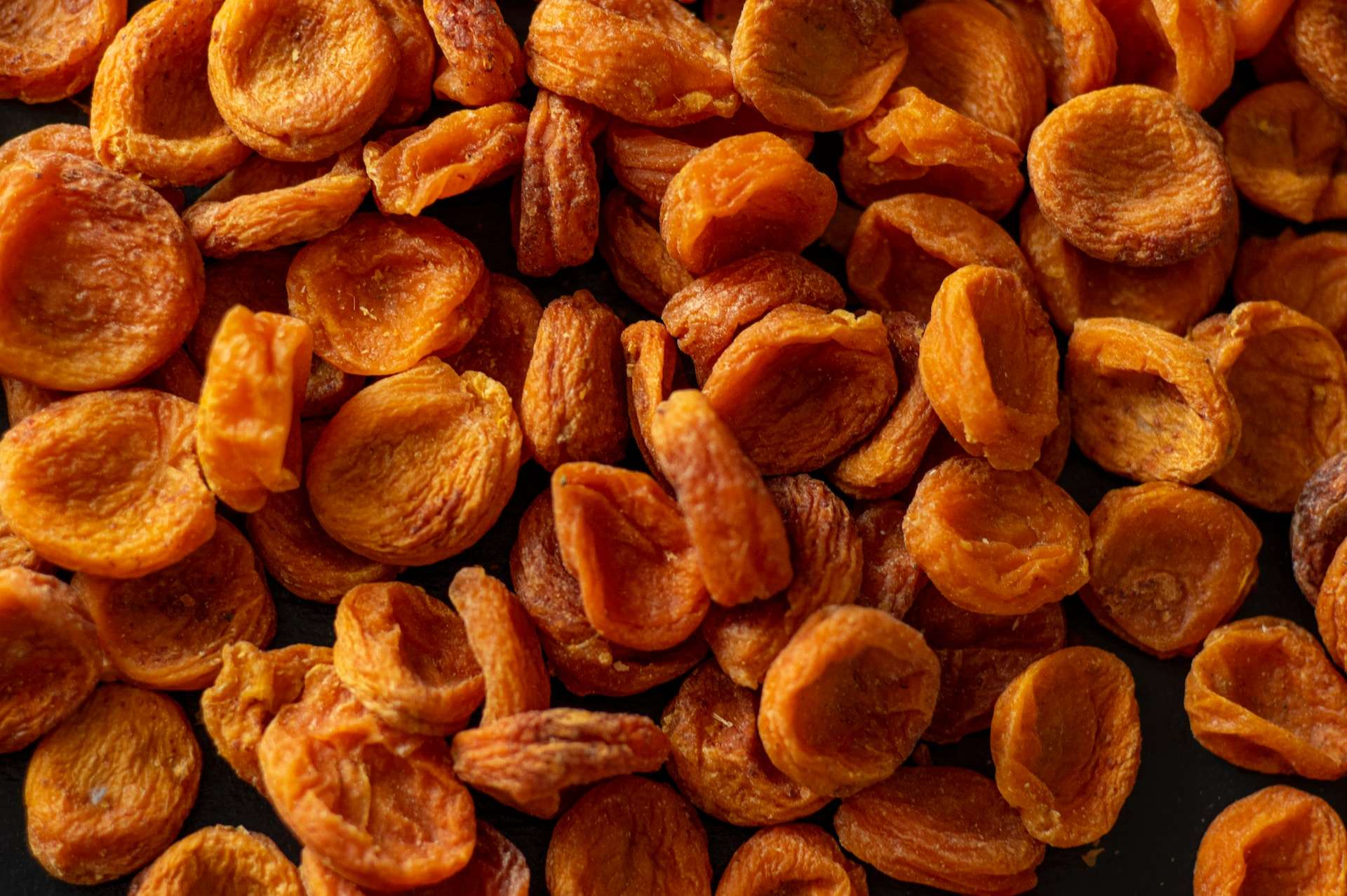
Dried apricots are a delicious and nutritious snack that have been enjoyed for centuries. These chewy treats are packed with vitamins, minerals, and fiber, making them a great addition to any diet. Whether you enjoy them straight out of the bag or use them as an ingredient in a recipe, dried apricots offer a host of benefits for your health and well-being. In this article, we will explore 17 fascinating facts about dried apricots that you may not have known. From their origins and nutrition content to their versatility in cooking and their potential health benefits, there is so much to learn about these versatile fruits. So, grab a handful of dried apricots and let’s dive into the wonderful world of this tasty and nutritious snack!
Key Takeaways:
- Dried apricots are packed with essential nutrients like vitamins A and E, iron, and fiber, making them a convenient and energy-boosting snack for anyone on the go.
- With their long shelf life, natural sweetness, and versatility in recipes, dried apricots are a delicious and healthy addition to your diet, offering benefits for digestion, energy, and overall well-being.
Apricots are members of the rose family.
Did you know that apricots belong to the same family as roses? This unexpected fact highlights their delicate and fragrant nature, making them a truly special fruit.
Dried apricots contain essential nutrients.
When apricots are dried, their nutritional value becomes even more concentrated. They are a rich source of vitamins A and E, potassium, iron, and dietary fiber.
Drying apricots extends their shelf life.
The drying process removes the moisture from the fruit, which helps to prevent spoilage. This allows dried apricots to have a long shelf life, making them a perfect pantry staple.
They are energy-packed.
Due to their high natural sugar content, dried apricots provide a quick and sustainable energy boost, making them an excellent choice for athletes or anyone in need of a natural pick-me-up.
Dried apricots are more portable than fresh ones.
While fresh apricots can be delicate and easily bruised, dried apricots are sturdy and much more convenient to carry around, making them an ideal snack for on-the-go.
Apricots are naturally orange in color.
The vibrant orange color of dried apricots is a visual testament to their high beta-carotene content, which is converted into vitamin A in the body, benefiting eye health and supporting immune function.
They are packed with antioxidants.
Dried apricots are rich in antioxidants, which help protect the body against free radicals and reduce oxidative stress, leading to healthier cells and overall well-being.
Apricots have a long history.
Apricots have been cultivated for thousands of years and are believed to have originated in China. They were highly valued by ancient civilizations for their sweet taste and medicinal properties.
Dried apricots can aid digestion.
The fiber content in dried apricots promotes healthy digestion by stimulating the movement of food through the intestines and preventing constipation.
They are a natural source of iron.
Dried apricots are an excellent source of iron, a mineral essential for the production of red blood cells and the prevention of anemia.
Apricots are low in calories.
For those watching their calorie intake, dried apricots are a guilt-free snack option. They are low in calories, yet high in nutrients, making them a satisfying and nutritious choice.
They can be enjoyed in various ways.
Whether eaten straight out of the bag, added to trail mix, baked into cookies, or used in savory dishes, dried apricots are a versatile ingredient that can enhance both sweet and savory recipes.
Dried apricots are a natural sweetener.
With their natural sweetness, dried apricots can be used as a healthier alternative to refined sugar in various recipes, adding both flavor and nutrients.
They provide a source of dietary fiber.
The high fiber content in dried apricots helps regulate blood sugar levels, improve cholesterol levels, and maintain a healthy weight.
Apricots are high in vitamin C.
These dried fruits are a surprisingly good source of vitamin C, an essential nutrient that supports a strong immune system and promotes healthy skin.
They can be rehydrated.
If you prefer the texture of fresh apricots, dried apricots can be rehydrated by soaking them in water or fruit juice, bringing back their juiciness and plumpness.
Dried apricots are a great addition to your diet.
Including dried apricots in your diet can provide numerous health benefits, from improving digestion and boosting energy to supporting overall well-being.
Now that you know these 17 exciting facts about dried apricots, you can enjoy these delicious and nutritious snacks with a newfound appreciation for their history, health benefits, and versatility.
Conclusion
In conclusion, dried apricots are not only delicious but also packed with numerous health benefits. They are a great source of essential vitamins, minerals, and fiber. Incorporating dried apricots into your diet can help improve digestion, boost your immune system, and promote healthy skin. They are also a convenient and portable snack option that can be enjoyed on-the-go.When purchasing dried apricots, make sure to choose organic and unsulfured varieties to avoid any harmful additives. Dried apricots can be enjoyed on their own as a snack or added to various dishes like salads, baked goods, and trail mixes.Remember to consume dried apricots in moderation as they are relatively high in natural sugars and calories. As with any food, it’s always best to consult with your healthcare provider or nutritionist for personalized advice and recommendations.So, go ahead and indulge in these delicious dried fruits, knowing that you are not only satisfying your taste buds but also nourishing your body with a plethora of health benefits.
FAQs
1. Are dried apricots good for weight loss?
Yes, dried apricots can be a healthy snack option for weight loss. They are low in calories and high in fiber, which can keep you feeling full and satisfied for longer.
2. How should I store dried apricots?
Dried apricots should be stored in an airtight container in a cool, dry place. Avoid exposure to moisture, as it can cause them to spoil or become moldy.
3. Can I eat dried apricots if I have diabetes?
If you have diabetes, it’s important to consume dried apricots in moderation due to their natural sugar content. It’s best to consult with your healthcare provider or nutritionist for personalized guidance on incorporating dried apricots into your diet.
4. Can dried apricots help improve digestion?
Yes, dried apricots are rich in dietary fiber, which can aid in digestion and promote regular bowel movements.
5. Can I eat dried apricots if I have a nut allergy?
Dried apricots are generally considered safe for individuals with nut allergies. However, it’s always important to read food labels and check for any cross-contamination risks.
6. Are dried apricots a good source of vitamins and minerals?
Yes, dried apricots are a rich source of vitamins A and C, as well as potassium and iron.
7. How can I incorporate dried apricots into my diet?
Dried apricots can be enjoyed on their own as a snack or added to salads, oatmeal, trail mixes, baked goods, and savory dishes.
Dried apricots are just one of many delicious and nutritious snacks you can enjoy. If you're looking for more healthy snack options, why not try edamame? Raisins are another great choice for those who love dried fruit. And if you're interested in learning more about the health benefits of antioxidants, we've got plenty of information to share.
Was this page helpful?
Our commitment to delivering trustworthy and engaging content is at the heart of what we do. Each fact on our site is contributed by real users like you, bringing a wealth of diverse insights and information. To ensure the highest standards of accuracy and reliability, our dedicated editors meticulously review each submission. This process guarantees that the facts we share are not only fascinating but also credible. Trust in our commitment to quality and authenticity as you explore and learn with us.


